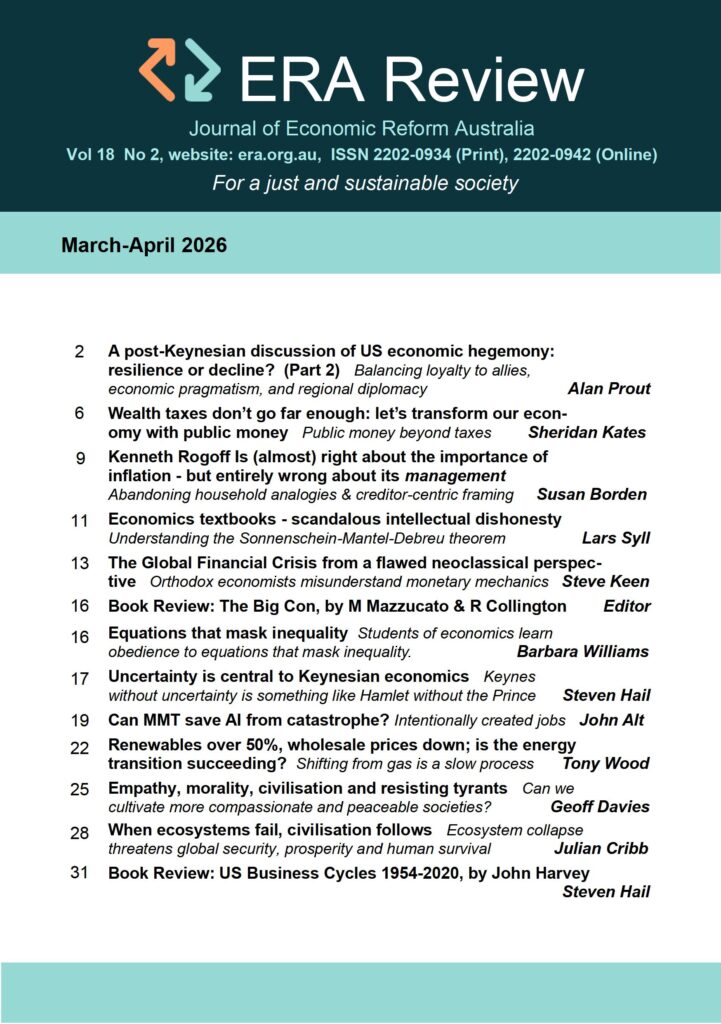Some concerns about the Job Guarantee
A Job Guarantee scheme must work in concert with an expanded public sector – Elinor Hurst
The Job Guarantee (JG) is an important component in the economic platform of Modern Monetary Theory. It proposes that the federal government will provide guaranteed jobs at the minimum wage for anyone who wants a job and can’t get one in the private sector. The jobs would be designed to provide socially useful services and yet be sufficiently flexible for workers to leave as soon as employment is offered to them elsewhere. The jobs would be federally funded, but locally administered.
It is argued that this scheme would provide an inflation balancing tool, which would at the same time provide dignity and a reasonable income to those who are currently unemployed.

Much work has been done by MMT economists to develop the detail of the Job Guarantee, and it is an admirable concept. It aims to reduce inequality, reduce poverty, and provide socially useful things. However, there are some concerns about how it would work in practice, which I believe need to be seriously considered.
An Honours economics thesis recently appeared on the topic of the Job Guarantee (Sturgess, 2018[1]). While the author’s level of economic authority may be questioned due to his relative newness to the discipline, his thesis was well written and well researched, and it has caught the attention of a number of economic commentators [2].
His criticisms about the macroeconomic impact may be dismissed (the usual concerns about cost and inflationary impact, which have been adequately dealt with by Bill Mitchell at length [3]), but the author’s criticisms of practical aspects of the JG in my view warrant closer analysis.
Sturgess refers to “the impossible quadrilateral” of aims to be met by the Job Guarantee, which are:
- the jobs will require only basic skills (needed for universal eligibility);
- the jobs will be socially beneficial;
- the jobs will be indifferent to time (as JG work is countercyclical);
- the jobs will be distinct from jobs in the rest of the public sector;
and asserts that it is impossible to achieve all of these qualities together in the one set of jobs.
Let’s look at some specific examples of the sorts of jobs advocated by MMT protagonists. Land restoration, child care, elder care, and building public infrastructure are often mentioned, although there are differing views on the suitability of some of these options. Pavlina Tcherneva says that infrastructure projects are not suitable due to the skills required and difficulty in stopping and starting them quickly [4], but Randall Wray speaks approvingly of building work done under the US New Deal scheme of the 1930’s and the Argentinian Jefes scheme, which are examples of historical experiments with a job guarantee [5].
Land restoration requires planning and oversight by a trained ecologist. Child care and elder care require training, understanding of child psychology and sensitivity to older people’s needs. The building of public infrastructure also requires training and oversight. So additional training would be required, as well as supervision from qualified personnel to ensure the work met a certain level of quality.
But would the minimal levels of training and qualified personnel involved be enough to compensate for the unskilled workers’ lack of experience, the lack of organisational context, collegial support and infrastructure? I think the assumption that they can underestimates what is involved in these types of jobs.
Consider also, that children and old people benefit from having continuity of personnel to care for them. A significant part of care work is “emotional labour” from personal interaction with the client and building a relationship with them.
If this can be snatched away at any moment by the worker getting a job elsewhere (which the JG assumes is desirable), then there is likely to be instability in the level of support, particularly if the number of workers available to clients decreases during a boom. Bill Mitchell [6] has addressed this issue by stating that there would always be a minimal baseline level of workers in the JG to maintain a consistent level of service. But if this is the case, why not just employ those workers as permanent public employees, and give them a career path?
There is a question of equity in terms of the services provided. The implication is that JG workers will provide child care and elder care to those people who are currently missing out on these services, due to lack of government funding and support, or because they can’t afford it.
There is no implication that those who can afford either the more expensive privately funded or government subsidised services, or who are lucky enough to be able to access them already, will be denied them. Does this not imply a two-tier level of service? One with professional staff who are well trained, experienced and well resourced, and one with a less-professional service via the JG for those who don’t have the income to afford these or are disadvantaged in other way (e.g. by virtue of their rural location). This seems to go against the asserted egalitarian spirit of the Job Guarantee.
It also seems that in considering child care and elder care to be “unskilled” work, JG advocates are making sexist assumptions about what are traditionally female gendered occupations. Yet in Scandinavian countries such as Sweden, child care and aged care are seen as essential government services which are well funded and provided free or at low cost by professionally trained staff. Early child care, in particular, is seen as critical by those who work in this field for enabling children to reach their full potential and to develop to physically and mentally healthy adults. It is not a trivial exercise.
As for building public infrastructure, there are quality concerns here as well. Such infrastructure needs to be safe and enduring. Public infrastructure deserves to be well built, and not a “second-rate” form of construction built with unskilled workers and with limited professional input. Public liability also needs to be considered, as there is a danger that inexperienced workers might inadvertently create safety issues by their construction methods.
If the private sector does not create a sufficient number of suitable jobs, or displays prejudice towards JG workers and is unwilling to hire them, there is a risk that the JG could assume the status of a permanent “home for lost workers” which maintains their wages at a minimal level, even as they develop skills and experience. There is also the danger that a government determined to keep costs down could use the scheme as a way of cheaply funding public sector services. But if the private sector prefers not to employ JG workers for whatever reason (e.g. resistance to creating ecologically sustainable employment, unwillingness to create better conditions, or ageism), then the regular public sector should provide opportunities for them to progress their skills and career further, while also being appropriately rewarded. To be fair, MMT economists such as Pavlina Tcherneva, Bill Mitchell and Randall Wray do clarify that the JG needs to be brought in along with a complimentary expansion of public sector programs to fill the much-needed gaps in social provision. However I am concerned that if this is not emphasised in proselytising for the JG, then the employment buffer program alone will be seen as the be-all and end-all of government fiscal expansion.

Other risks are to worker incentives in the scheme, and to a continuing lack of opportunities for more skilled and educated workers. There may be insufficient incentive to develop yourself in the JG job if you are only being paid the minimum wage, and the same as others who might be very unproductive and unskilled. People would lose opportunities to contribute more to the economy if they weren’t afforded the chance to work with the right infrastructure, colleagues and community to develop their skills, or to exercise the skills already gained. For example, what if the person was interested and talented in experimental science? There won’t be vast laboratories provided by the JG, nor extensive support from the scientific community. If universities and research institutions remain understaffed, jobs won’t be available there. Yet if, say, the CSIRO were once more expanded, there could be great opportunities there for that person to contribute and develop their skills and knowledge rapidly. Talent needs the right environment in which to grow. There is a limit to how much the JG can provide this.
It is true that there have been a number of historical implementations of JG-like programs, which have enjoyed some success in lifting people out of poverty, building skills of previously unemployed people, and in providing goods and services that would not otherwise have been available. Examples often cited are the US New Deal program (Works Progress Administration) in the 1930s, the Plan Jefas in Argentina in the early 2000s, and the Mahatma Gandhi National Rural Employment Guarantee program in India, which was initiated in 2006 and is ongoing.
Sturgess discusses the pro’s and con’s of these programs in practice, and I recommend that the interested reader consult this work for more detail. In short, while benefits have accrued, they have not been without their problems. In the case of the WPA, public authorities were guilty of substituting WPA workers for existing public employees at times. Plan Jefas entailed workers who provided services that could have been provided by the private sector or by the state, but were inaccessible to poor Argentinians due to the high cost or to an inadequate provision in low-income areas. The MGNREG has been vulnerable to corruption, along with production of work of poorer quality and in unsafe work environments. These schemes might be considered “better than nothing” in the circumstances, but in a modern developed economy I think our standards should be higher.
In their enthusiasm for promoting the Job Guarantee, advocates sometimes seem to either ignore or undervalue work in the regular public sector, and to assume that almost any publicly needed goods and services can be filled by JG workers. This then does nothing to counter the neoliberal ethos that only private sector jobs are worth compensating at higher salaries, and that public funding is such a scarce resource that we cannot afford to fund the public service at any higher levels than now. Yet Scandinavian countries show us that a higher taxing, higher spending government can provide high quality public goods and services, which promote equality with their universal nature, and sustainability with their investment in greener technologies and services. This is an important part of the argument for equitable sustainability that needs to be made.
The Job Guarantee may well be a part of providing a pathway for unemployed people out of their stagnation, but the public sector itself needs to expand, if we are to have any chance of meeting the multiple and complex requirements of moving to a greener, fairer society.
References
[1] Sturgess, Hugh (2017) “Would a Job Guarantee guarantee jobs? An analysis of the evidence.” Honours Thesis, University of Sydney.
[2] For example, Timothy Taylor at http://conversableeconomist.blogspot.com/2018/04/the-job-guarantee; Matt Bruenig at http://peoplespolicyproject.org/2018/03/22/some-notes-on-federal-job-guarantee-proposals/; Don Arthur in the Parliamentary Library paper on the Job Guarantee, http://www.aph.gov.au/About_Parliament/Parliamentary_Departments/Parliamentary_Library/FlagPost/2018/April/Jobs_Guarantee [3] See Bilbo.economicoutlook.org for Bill Mitchell’s many articles on the Job Guarantee.
[4] Tcherneva, Pavlina (2018) at https://www.pavlina-tcherneva.net/job-guarantee-faq
[5] Wray, L. Randall (2012) “Modern Money Theory”, pp 234-235
[6] Mitchell, Bill and Wray, Randall (2005) “Full Employment through Job Guarantee: A Response to Critics”, Working Paper No. 39
Elinor Hurst has a background in science and IT, and has been interested in eco omic issues for many years. She is also a member of the ERAR editorial committee.































